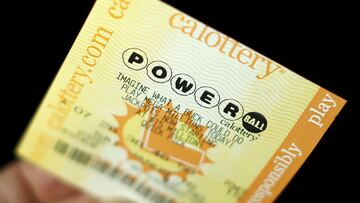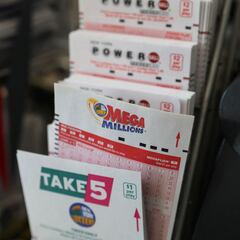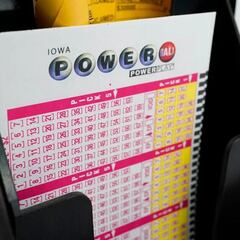How much tax would you pay if you won the $1.4 billion Powerball jackpot?
The latest Powerball jackpot has entered the top five of biggest jackpots in US history at $1.4 billion. Quite the sum, but not so much after taxes.

Thanks to some tweaks to the rules, Powerball jackpots have been reaching mind-blowing amounts. The drawing for Monday 2 October is the fourth time it has risen above the billion-dollar mark. Including the Mega Millions lottery, it’s the ninth jackpot in US history to achieve such dizzying heights.
The odds of winning the Powerball jackpot to put it mildly are a long shot. However, even though they are 1 in 292.2 million, it doesn’t stop the millions who buy a ticket for the opportunity. However, there are one-in-one odds that you’ll fork over a hefty share of your winnings to Uncle Sam, no matter how you claim your prize.
So just how much will you be left with?
Winners have two ways to claim the Powerball prize
When someone wins there is the option of being paid in an annuity plan or as a cash option.
Were you to plump for the ‘annuity option’, you’d get the jackpot in its entirety, but not all at once. Imagine you matched all the numbers for a $100 million jackpot. First you’d get an initial payment of $1.5 million and then 29 more payments over 30 years with each payment increasing by 5% until the final payment would reach roughly $6.2 million. To do some back of the envelope math, divide the current jackpot buy 100 and then go from there.
If you take the former, you’ll get the money as an up-front, lump-sum payment, but it won’t be for the whole kit and caboodle. The ‘cash option’ payout is equal to the cash in the Powerball jackpot prize pool.
Tonight’s Powerball jackpot is $1.4 BILLION 😍 It just keeps growing! Visit your local Lottery retailer today. pic.twitter.com/nKgg5vajar
— Mass. State Lottery (@MAStateLottery) October 7, 2023
The majority of winners tend to go for the lump-sum payment - “most of them want all their money now,” Mega Millions lottery spokesperson Elias Dominguez told ABC.
In either case you still have to figure in taxes.
How much do winners pay in taxes?
Before the money reaches the jackpot winner, it’s subject to a 24% federal tax on gambling winnings for all winnings over $5,000.
When tax season comes around, you’ll find yourself on the hook for another piece of your lottery money. That’s because even a seven-figure let alone a ten-figure Powerball win will have pushed you, rather comfortably, into the IRS’ highest income-tax bracket of 37%. For a single-filer in 2023 the threshold is earnings over $578,125 and married filing jointly over $693,750.
So the winner would be liable for the 13% difference between that and the 24% applied to gambling winnings.
Depending on which state you reside in and pay taxes to can also make a difference. There are eight states that do not tax Powerball winnings: California, Florida, New Hampshire, South Dakota, Tennessee, Texas, Washington, Wyoming. However, either way you’ll have to deal with the federal taxm collector.
If you live in one of the nine states that don’t tax income, the remainder is also yours to do with as you please. Those states include Alaska, Florida, Nevada, New Hampshire, South Dakota, Tennessee, Texas, Washington and Wyoming. However, if you live in another state that does tax income you may have another 2.9% to 10.9% reduction in your winnings after taxes.
You're more likely to go pro in the NBA than hitting a Powerball or Mega Millions jackpot. Good luck, though! pic.twitter.com/jxOOeu2u1T
— USA TODAY Money (@USATODAYmoney) June 19, 2023
What chance is there of winning?
The odds of winning the Powerball jackpot are 1 in 292,201,338, so you’re more likely to win at a slot machine than the grand prize.
To put that into context, there is a 1 in 500,000 chance of being struck by lightning, according to the CDC. That means you will be struck by lightning a whopping 584 times before you win the lottery.
Probably can’t do much with that money considering you would be reduced to a pile of ash.
How do you play?
When you play Powerball you need to choose six numbers from two separate pools for the drawing. Players choose five numbers between 1 and 69 for the white balls and one number for a red ball, or Powerball, from 1 to 26.
Related stories
There are a total of nine ways to win a prize in Powerball, ranging from $4, recovering your initial $2 buy-in plus $2, to the jackpot. Players can increase their prize amounts by spending an extra $1 for the “PowerPlay” option to win two, three, four or even five times as much. However the PowerPlay only applies to non-jackpot prizes below $1 million. Any PowerPlay number doubles the $1 million prize.
Powerball drawings are held every Monday, Wednesday and Saturday at 10:59 p.m. ET.

